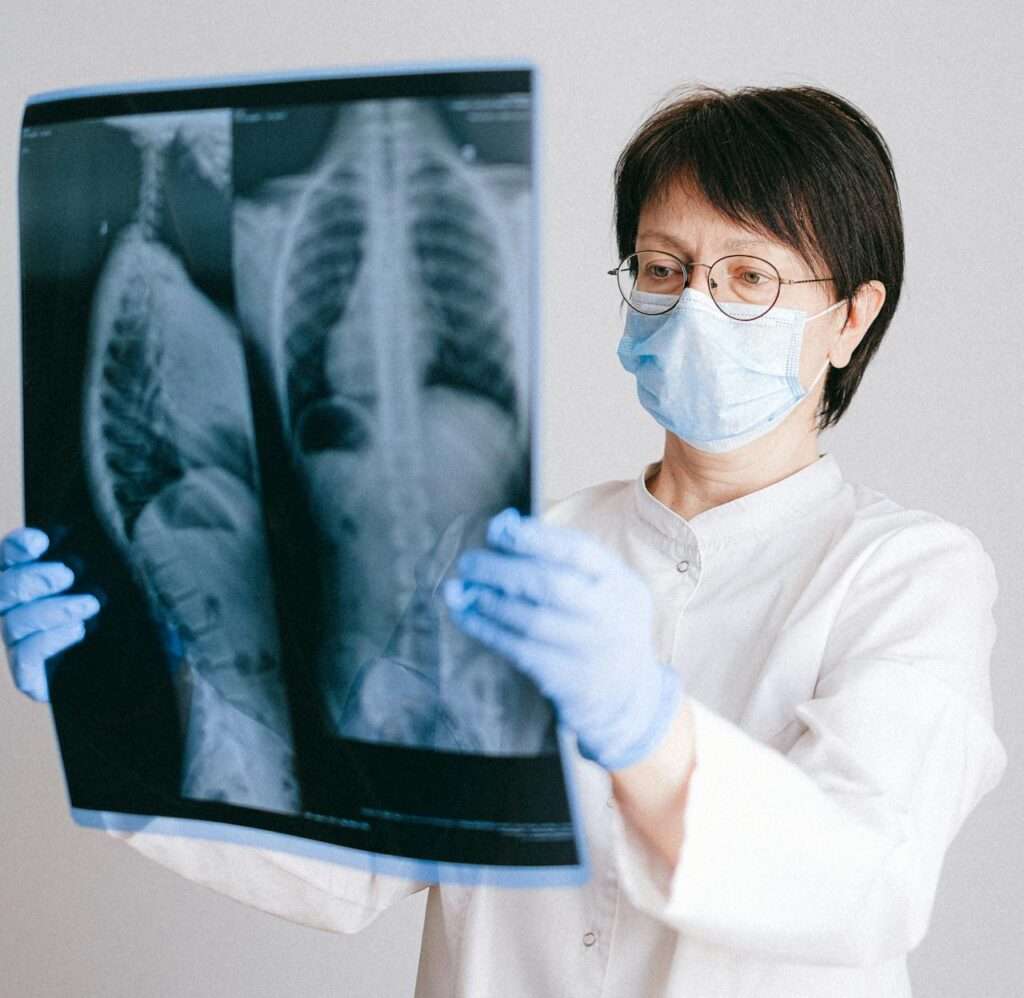
Table of Contents
Respiratory disease is one of the biggest killers in the United Kingdom, encompassing diseases such as lung cancer and asthma. Breathing complications caused by lung disease can extremely impact your ability to function normally and sometimes it may shorten longevity. Lung disease can make even a simple everyday task feel impossible. You may be eligible for a lung disease compensation claim if the cause of your illness was due to someone else’s negligence or breach of duty. Common circumstances include workplace exposure to perilous substances, medical negligence or sometimes environmental pollution.
This guide will provide detailed information about lung injury claims. It will explain how and when you can file a claim for damaged lungs or lung disease, helping you seek the justice you deserve.
Our expert team of solicitors at Claim Time is here to help and fight for your rights. Our lawyers will review your lung injury claim for free, and if there is a chance for success, and you wish to proceed, our qualified personal injury solicitors will be there to assist with your lung injury claim. With our no win no fee policy, you don’t pay unless we win. Therefore, you have nothing to lose and everything to gain.
To know more about lung disease compensation claims, you can reach us at 0800 970 2727, or contact us through our website, and we will get in touch with you shortly
What is lung disease?
Lung disease refers to any condition that affects the lungs and damages their ability to function properly. These diseases can involve the airways, tissues, or blood vessels in the lungs, which leads to difficulty breathing and reduced oxygen levels in the body. Some common types of lung diseases include:
- Chronic Obstructive Pulmonary Disease (COPD) – It is a progressive sickness that makes it difficult to breathe and is often caused by smoking or long-term exposure to irritants.
- Asthma – It is a disorder where the airways become swollen and narrowed which makes breathing difficult. It can be stimulated by allergies, exercise or environmental factors.
- Pulmonary Fibrosis – It is a condition where the lung tissue becomes damaged, making it difficult for the lungs to work properly. This can be triggered by various factors which include exposure to toxins or certain medical conditions.
- Lung Cancer – It is an uncontrolled cell growth in the lungs which is often caused by smoking or environmental factors.
- Pneumonia – It is an infection that inflames the air sacs in one or both lungs, causing difficulty breathing.
- Tuberculosis (TB) – It is a bacterial infection that mainly affects the lungs badly.
- Pulmonary Hypertension –This happens because of the high blood pressure in the arteries of the lungs which sometimes can strain the heart and make it difficult to breathe.
Common symptoms of lung diseases
The symptoms of lung diseases can vary depending on the condition but may include:
- Persistent breathing difficulties.
- Chronic shortness of breath.
- A persistent cough that doesn’t go away.
- Feeling as though you cannot get enough air into your lungs.
- Coughing up mucus or blood.
- Pain or discomfort when inhaling or exhaling.
- Difficulty performing physical activities such as working or exercising.
If you experience any of the above symptoms due to hazardous working conditions, consider pursuing a lung injury claim with Claim Time Solicitors.
Essential steps to take for lung disease compensation claims
The lung disease compensation solicitor at Claim Time recommends reporting the incident right away if you believe that the illness is due to hazardous conditions at work. To safeguard your health, you should first see a healthcare professional, who can provide the help you need, as your health comes first.
When in the position, report the incident to the authorities or supervisor. This will ensure that a formal record is created, which can help in any legal proceedings later on. Also, try to gather evidence of your working conditions, such as employer records, witness statements, and medical reports.
Keep a detailed record of all the expenses you spend on things related to the accident, this includes medical bills, rehabilitation bills and transportation costs. This can help you assess the compensation of your lung injury claim.
After completing the steps mentioned above, you can speak to our experienced personal injury lawyers for a free initial consultation, during which they will determine the viability of your claim. Our solicitors will guide you through the process of filing a successful claim to ensure you receive the full compensation you deserve.
If any investigation is led it’s important to cooperate fully. This can help identify the cause of the accident and aid in developing strategies to eliminate the chances of future incidents.
Types of employer negligence that can lead to lung disease claims
There are several types of employer negligence that can lead to workplace-related lung diseases. Understanding the factors that can cause these diseases is key to determining whether you are eligible to file a lung injury claim. Here are some factors that may lead to lung disease:
- Inadequate ventilation
Employers must certify proper ventilation, particularly in workplaces which are exposed to harmful substances. Failure to install or maintain ventilation systems such as Local Exhaust Ventilation (LEV) could validate a claim for lung damage. - Failure to control or monitor exposure
Employers are required to monitor air quality and reduce the exposure to hazardous substances. A lack of safety etiquette which includes engineering controls or risk assessments, may make them accountable in a lung disease compensation claim. - Inadequate personal protective equipment (PPE)
Providing appropriate PPE, such as respirators or masks, is a legal duty for employers. If your employer failed to provide or enforce the use of PPE, you could pursue a lung injury claim caused by negligence. - Inadequate training
Appropriate training on the risks associated with harmful substances is vital. Lack of adequate training may form the basis of a lung disease claims process. - Ignoring health and safety regulations
Employers must follow health and safety standards to protect workers. Non-compliance can lead to diseases, making them liable in a lung disease compensation claim process.
Evidence to support a lung disease compensation claim
If you want to file a compensation claim for lung disease, it is vital to provide clear evidence showing what caused your illness. This evidence should explain how the disease has affected you and what actions or failures by the defendant led to your condition. Thorough documentation is important for attracting the insurance company’s attention and securing swift approval for your claim.
The types of evidence for a lung disease compensation claim your personal injury solicitor may use include:
- All your medical reports can act as evidence. Therefore, a medical professional must diagnose your lung disease. Your solicitor will ask for copies of your test results and the medical notes from the consultant who examined you.
- Visual evidence, such as photographs or videos of the workplace, equipment, or substances you were exposed to, can be of great help and can act as evidence to support your lung injury claim.
- Witness statements from colleagues and other employees might help you justify your lung disease compensation claim.
- If you wrote to or emailed your employer to raise concerns about your well-being, these could also be used as evidence in your lung disease claims.
Take the first step toward compensation for your lung injury with our fast and confidential claim checker form.
Use our claim value estimator to get an instant estimate of the compensation you could receive for lung injuries.
Start the lung disease compensation claims process
By choosing to work with Claim Time Solicitors you are correlating with the most trustworthy team of lawyers which is committed to your success. Our personal injury solicitors manage no win no fee cases each year, securing millions in compensation. Our knowledgeable solicitors here at Claim Time understand how lung disease might have a distressing impact on your life which is why we try to create personalised strategies for your needs.
Our widespread secure nationwide network ensures that you have easy access to our legal team. Reach out to our no win no fee lawyers at 800 970 2727. You can also contact us online to schedule a callback from us, we will connect to you shortly.
Lung Disease Compensation Claim -Know more
There is a time limit of three years to file a lung injury claim. Some exceptions may extend this time limit.
- For minors, claims can be filed on their behalf, until they reach the age of 18.
- In cases of criminal assault, the limit is two years, but it may be extended if you are unwell or unable to claim.
- For individuals experiencing mental incapacitation, the time limit is suspended until capacity is fully regained.
To file a lung disease compensation claim, you need to validate the following:
- The carelessness by your employer has resulted in a breach of their duty of care, which they were obligated to maintain towards their employees.
- Their negligence directly caused or contributed to your lung disease.
If both conditions are met and you are within the three-year limitation period, you may be eligible to pursue a lung injury claim for the suffering and losses.
Huffing irritants such as dust and fumes can cause respiratory and lung diseases and can also worsen pre-existing conditions. Sometimes exposure to asbestos dust can cause asbestosis, lung cancer or other asbestos-related diseases and exposure to silica can cause silicosis.
Breathing in coal dust, spores, dust from textiles, fumes from welding, smelting, pottery-making and plastics manufacturing, spores from grain and wool, and mould from hay can also cause respiratory diseases which might be fatal.
Vapours from chemicals and gases such as formaldehyde, chlorine and ammonia are predominantly dangerous. Other harmful fumes can be found in paints, acids and solvents, cleaning materials, lacquers and pesticides.
FAQs
We have a variety of options available to help fund your lung disease claim. Making a claim with Claim Time is free if you or a member of your family is part of a trade union. For non-trade union members, we operate a provisional fee agreement, also known as no win no fee. This means if your case is unsuccessful, you won’t have to pay any charges and we limit the deductions we take if you win.
The length of time it takes to secure compensation for your lung disease claim depends on case to case. While some cases can be settled within a few months, more complicated cases can take a year or two to resolve. Our dedicated lawyers will work hard to fight your claim and secure your compensation in the shortest time possible.
There are certain industries and work activities which are connected to a higher percentage of workers developing lung disease. People who work in construction, agriculture, manufacturing, automotive and mining industries are at greater risk of developing a lung condition, as they are exposed to harmful fumes, gases, vapours, dust and chemicals.


